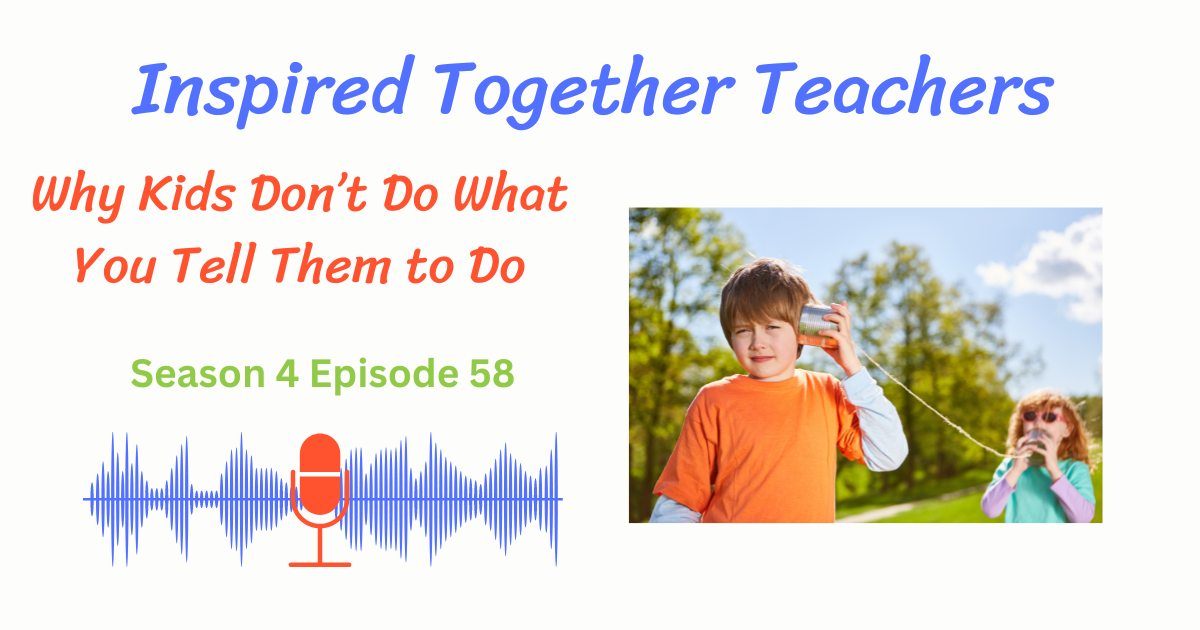Why Kids Don’t Do What You Tell Them to Do S.4 E.58
Listen to this episode to learn 10 reasons why kids don’t do what you tell them to do.
Show Notes:
Episode Summary:
Do you ever feel the exasperation of asking kids to do something only for it to fall on deaf ears? These “kids” could be your students at school or your family members at home. They could be young children or teenagers. No matter the age, do you find yourself wishing they would just do what you ask so life could be easier? We don’t have all of the answers to this age-old dilemma, but in this episode we share some useful suggestions to decrease your frustration and get you and the kids in your life more in sync.
In this episode:
We’ve all felt the exasperation of asking students or children in our lives to do something only for it to fall on deaf ears.
As a teacher, this likely happens to you at school several times per day, regardless of whether you teach the littles, the elementary aged kids, the middle schoolers, or the teens.
If you are a parent, or beloved auntie or uncle, this probably happens at home on the regular as well.
Giving so many directions in a day, with so many opportunities for a non-response from the children in your life, can really build up your frustration level.
Our first response when we get no action from a child after a direction is given, is usually to repeat our direction, which often results in more non-action, until finally we resort to yelling or letting our frustration clearly show in our voices even if we don’t yell. We hate that we have succumbed to yelling, nagging, or showing our disapproval through our voice tone and they hate it too.
Why don’t students do what we ask of them? If we could figure it out, it might lead us to another, better way of communicating.
Today we will explore 10 reasons why the kids in your world might not be listening and how you can best communicate your expectations in a way they will understand. This is not an exhaustive list, but it will give you some things to think about when you feel frustrated when children don’t do what you ask.
1) They didn’t process the request.
This is particularly true of very young children. If you ask a three year old to go to the corner of the room, pick up her toys and put them on the shelf, you are not likely to get compliance. You lost her in the three part direction- she heard “go in the corner of the classroom,” where you find her happily dumping out a bin of blocks.
Many older children also have processing delays; they hear part of the request and forget the rest. Try giving simple directions. Use picture clues such as signs. Another idea is to give cues. For example, before we can go to lunch there are three things I need you to do. Listen for the three things. First… then second… then lastly… Ask children to repeat the directions.
2) They didn’t hear the request.
Let’s face it, it is a noisy world.
Have you ever said something to someone, only to realize that they couldn’t hear you?
Maybe a child has still has their ear buds in from their time on the computer. Maybe there is a lot of peripheral noise. Many people have difficulty hearing in a noisy environment. At school, today’s classrooms often include multiple teachers working with multiple groups. Excessive noise can be a challenge.
Make sure you have attention before giving a request. Use hand or light signals. Look them in the eye. Try a loud whisper or a catchy call back to attract attention. If they don’t hear you, they can’t comply with your request.
3) They don’t understand the reason for the request.
As much as we might like to think “because I said so” is a good reason, children often respond well to a request when they understand the motivation for the task. Saying ” I don’t want you to walk around the classroom right now” becomes a challenge to be contested. Explaining that you don’t want them to walk around the classroom at the moment because you are giving important directions that will help them with their homework works better.
Children might see a fire drill as an opportunity to talk to their friends. When the teacher explains that it is important that they to be quiet so that she can listen for fire safety personnel or to hear if someone needs help, they are likely to move through the halls quietly. Whenever possible, give children reasons why you want them to do something.
4) The task is too challenging.
This might not apply to simple tasks such as asking a child to put on her shoes, but it often applies to tasks such as homework. A struggling reader might shut down when confronted with the task of reading a long chapter of a book that is beyond their reading level. A child who feels that playing a musical instrument is too hard or the requested practice time is too long will not practice.
In the classroom, children may not understand the directions and give up if the work seems too difficult. For many students, it feels better to not complete work than try it and fail. They would rather be known as a trouble maker than as a failure.
Make sure work is at a level that is not too easy, but also not too hard. Encourage students by helping them to understand that trying and doing something wrong is an opportunity for learning.
5) The task is not challenging enough.
Students often reject tasks that are not challenging as “boring” or a “waste of time.” If a student can successfully complete ten two digit subtraction problems, do they really need to complete 100 more? Our brains like novelty and interesting things. Rote copying of answers directly from the textbook to the paper does not stimulate interest or curiosity. Whenever possible, make sure tasks have some level of challenge.
Sometimes we do need to do repetitious or boring tasks. Anyone who has ever played airplane to get a small child to eat vegetables understands the power of fun and novelty. When you ask children to pick up the classroom, turn on the timer on your phone to make it a game. See if they can beat their best time. Practicing spelling words? See if you can find ten different ways to spell them- with a pen, by writing with your hand on someone’s back, writing with your foot by making letters in the air…
In Episode 46 of this podcast, which is titled “What’s stopping you from achieving your goals” we referenced the research of Edwin Locke, a psychologist who spent decades study goal setting. His research applies here as well. He found that challenging goals improve performance more than easy ones. As Locke and other researchers have discovered, there is a sweet spot for challenge when setting a goal. People who set goals that are too easy, are actually less likely to achieve them. However, if you set the goal so high that it is nearly impossible to meet, you will quickly lose motivation. You need to find the “Goldilocks” of challenge level for your specific goal. We see a direct connection to asking students to do something. You need to give them challenge so they are more likely to achieve it but not so much that they think, “I’m never going to be able to do this, so why should I even try?”
6) They are meeting a personal need.
After talking with your class about the importance of using kind words when disagreeing, you find out that after school one of your students used unkind words to exclude another student from her social group. The exclusionary language might have been a method for your student to gain peer approval or social status from other students. Her need for peer approval is higher than the need for teacher approval, so she doesn’t do what you asked.
Playground fighting is another example of how children demonstrate a personal need. You’ve talked with a student who is fighting with his peers at recess. He continues to fight. He might be fighting to meet a need for power; as long as he can hit other kids, he feels powerful.
When a child’s behavior is caused by their desire to meet a particular need, often you can help the child figure out a better way to get their needs met. Ask questions. What does it mean to be “popular” and how else can you gain popularity? Likewise, what other things could a child do to feel more powerful? What opportunities could you find to give a child power in positive ways?
7) They feel a need for autonomy.
No one, including children, likes to be controlled 100% of the time. Think about how you feel when you are micromanaged. You like to have some control over your tasks and how they are done. Children do as well.
If children never have choices, they may refuse to cooperate with requests. Children who don’t complete homework despite adult requests may perform better if they are taught to set up a schedule and to choose which homework to do first. Many students will take more responsibility for their work when they are allowed to chose a datebook or planner and keep track of their own work. If children are used to someone else constantly dictating what they do and when they do it, they are not likely to want to or be able to manage without that constant reminder. Children need to be taught skills that will allow them to be independent.
8) They don’t like or respect you.
It is human nature to resist doing something for someone we don’t like. Children are often reluctant to do something for someone they don’t respect. Many adults believe that they deserve respect just by being adults, but many children and adolescents don’t see it that way. Respect is more of a two -way street. It is given and earned on both ends.
If you think that respect is at the heart of the issue, ask yourself why. What can you do to build respect? The way to solving this problem is by building relationships. Do you treat the young person with respect? Do you ask about and care about their experiences and feelings? Do you listen to them? Do you take their perspective into consideration? Building relationships takes time, but is worth it.
9) The timing of the request is off.
Sometimes, students fail to complete a request because the time is not right. For example, students might not complete homework directly after school because they are hungry or thirsty or need some physical activity after a long day of sitting. Being extremely tired is another reason for slacking; think of how much work you get done when you are very tired.
In Abraham Maslow’s Hierarchy of Needs, our basic needs, such as the need for food, water, air and sleep come before anything else. Take these needs into consideration before asking children to comply with a task.
10) They are suffering from trauma.
After the most basic human needs for survival, Maslow’s next step tells us that we must feel physically and emotionally safe before we can learn or attend to other tasks.
Children who have or who are experiencing trauma have bigger issues than following directions. Their safety needs must be met before they can work on other things. They may not be able to focus on your directions because the trauma is impacting their learning and behavior. There are no quick fixes here but creating a safe space and building relationships with the student are crucial. Do your best to get to the bottom of the issue, and get help from a professional such as a school counselor, social worker, mental health professional or a physician. You can also research trauma-informed teaching to learn strategies to get you started.
Recap:
It can be extremely frustrating, discouraging and even exasperating when the kids in our lives don’t do what we ask or tell them to do. In this episode we considered 10 common reasons why kids don’t act on our requests or directions. As we mentioned at the beginning of the episode, it is not an exhaustive list, but it will give you some things to think about when you feel frustrated when children don’t do what you ask. Ultimately, by better understanding why the child might not be responding, we can consider and act upon better ways of communicating.
Related Episodes/Blog Posts:
Episode 46 What’s Stopping You From Reaching Your Goals?
Connect with the Inspired Together Teachers Community:
Website: https:www.inspiredtogetherteachers.com
Instagram: Inspired-Together-Teachers
Facebook: Inspired Together Teachers
Facebook Teacher Warriors Group: Teacher Warriors Facebook Group
Linked In: Inspired Together Teachers
More About Inspired Together Teachers:
Are you a teacher struggling to balance your best work with your best life?
If you are dedicated and caring but often overwhelmed and exhausted, join us at Inspired Together Teachers. We’ll give you inspiration, strategies and tips that help you navigate life’s challenges as a stronger, more confident, and more joy filled person, both in and out of the classroom.
Inspired Together Teachers will give you practical tools to experience more of what matters most in your life.
Co-hosts Paula Schmidt and Michele Vosberg are award winning educators with the experience and skills to help teachers thrive in life and work. They’ve taught at all levels, worked with thousands of teachers, and conducted workshops around the world. They are also the authors of the #1 best-selling book The Inspired Teachers Journal: A Weekly Guide to Becoming Your Best Self.
Paula and Michele would love to have you to join them on their quest to lived inspired lives.




 If you are feeling especially exhausted, know that you are hardly alone. What many teachers expected to be a more normal school year has been anything but normal. The pandemic continues and has caused disruptions in our daily lives. Students still come and go either because they have Covid or because they have been in close contact with someone who has. In some districts, parents have been expressing extreme views and sometimes extreme behaviors in terms of supporting vaccines and masks or rallying against them. Teachers are caught in the middle at a time when it seems that no matter what you do, you will not please everyone.
If you are feeling especially exhausted, know that you are hardly alone. What many teachers expected to be a more normal school year has been anything but normal. The pandemic continues and has caused disruptions in our daily lives. Students still come and go either because they have Covid or because they have been in close contact with someone who has. In some districts, parents have been expressing extreme views and sometimes extreme behaviors in terms of supporting vaccines and masks or rallying against them. Teachers are caught in the middle at a time when it seems that no matter what you do, you will not please everyone.

